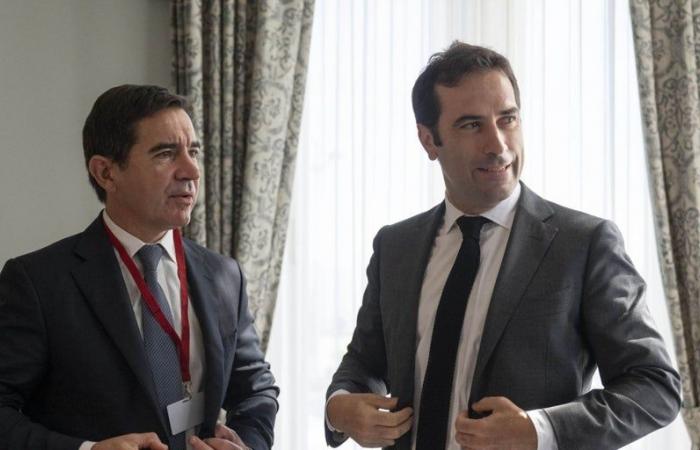The possibility of the government to torpedo the BBVA OPA on Banco Sabadell It faces strong legal doubts both for the forms and for the fund, according to jurists and experts consulted by this newspaper. The operation is currently in a … Spiny point after the national Commission of Markets and Competition (CNMC) has given its approval with commitments agreed with the Basque entity and after which the so -called phase three opens to intervene the Executive.
The Minister of Economy, Carlos Body, provides until May 27 to raise the case to the Council of Ministers and then have another 30 business days to decide his intervention. The Law of defense of Competition is what regulates that government participation.
The regulations set that the intervention can only be done “attending to criteria of general interest other than the defense of competition”, since the latter is precisely what the CNMC has analyzed. The law lists these criteria: «National Defense and Security, Public Health or Health Protection, free circulation of goods and services within the national territory, environmental protection, promotion of technological research and development, and guarantee of adequate maintenance of the objectives of the sector regulation». Some of the experts consulted consider that the causes are very priced, and that the government cannot get out of there. Others, however, such as Rafael Allendesalazar, director of Mlab Abogados, interprets that examples appear in this list, but that in reality the Executive could use more criteria as long as they adhere to the general interest.
The legal framework, according to legal sources, is diffuse in some aspects and little concrete in others. The law establishes that the Government may confirm the resolution of the CNMC or authorize the operation with or without conditions. This implies that the Executive can soften the conditions – as has already happened in the past – or harden them, of what there are no precedents.
The consulted sources coincide, however, in which the spirit of the law was to give power to the Government to soften the demands imposed by the CNMC or to authorize operations that it prohibits, not to harden them as the Executive intends to do, disallowing the institutions. In this sense, a former high position of a regulatory agency ensures that if what the Executive wants is to block the operation for political reasons, which is what appears because the competition problems already solve the CNMC, which approves a decree law in which it makes clear that the opas need government authorization, including those that are in progress, assuming the political cost that this would be.
The spirit of the law that enables government intervention was thought to soften CNMC conditions, not to harden them
Although the spirit of the law will focus on softening the conditions of the CNMCthere is some consensus in which the Executive is enabled to harden the resolution for BBVA. And to justify, the government has drawn a public consultation so that any person, company or organization thinks about the OPA. «It is a mamarrachada, a populist movement without any legal impacta dislate, we are at the level of the Roman circus … », say some of the sources consulted, which explain that this consultation for an administrative act is not included in the law that regulates it, since this figure is reserved for bills and regulations. But neither is it prevents in any precept. So, the doubts that this public consultation can be made are great among the jurists, although they do coincide that it does not serve to legally base the rejection of the operation with harder conditions.
Less doubts in the government, in any case, must motivate the reasons for its intervention a lot, even more so if it causes with its decision that BBVA renounces the operation. The jurists emphasize that the general interest that invoices must have a legal basis and be proportional to the case in question.
Experts predict that the Executive will have to balances to motivate their decision, although the concept of «General interest» be wide; There are doubts for example that the destruction of employment or the closure of branches can be argued, as has been slipped on certain occasions. If the requirements are not met, use political motifs or enters issues of competence, it is exposed to the Basque Bank taking it to court.
Power deviation
Thus, an excessively aggressive maneuver by the government to stop the operation could have consequences for both their interests and the public treasury. Santiago Martínez Lage, president of the Office Ayala de la Torre Abogados and expert in competence law, warns that the Council of Ministers will have to be very careful when imposing conditions not to incur what is legally called deviation of power, “which is what happens,” explains, “when an administrative body, and the Council of Ministers is, uses a power that grants it by the law. He was recognized.
“If you incurred power deviation,” he continues, “the Supreme Court It could cancel the administrative act of the Council of Ministers, the concentration operation would be approved under the conditions established by the CNMC and the affected part (BBVA) could invoke the patrimonial responsibility of the State for the damage that would have been caused. In fact, there are precedents of this. In 2003, the Supreme Court forced the State to compensate with more than 26 million euros to the digital satellite channel, the audiovisual platform promoted by the Prisa Group, for the damage caused by a decree approved in 1997 by the Aznar government in the framework of the so -called ‘Digital War’ and that the Court concluded that it was promulgated to favor the other contender of this conflict between private companies, Via Digital.






